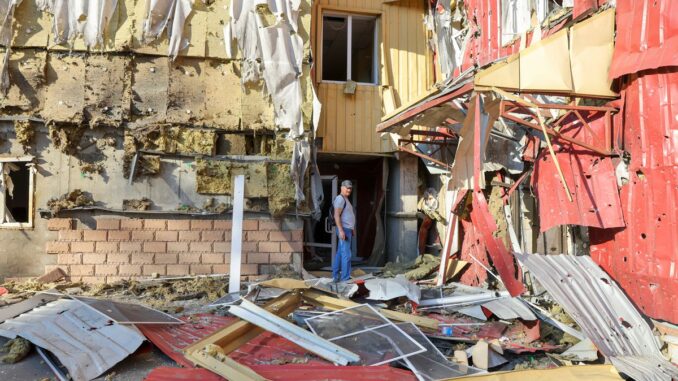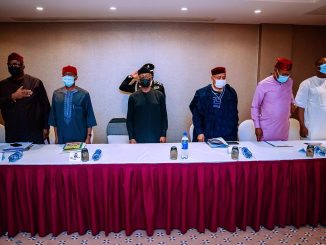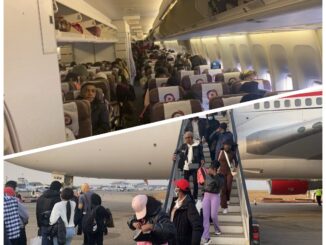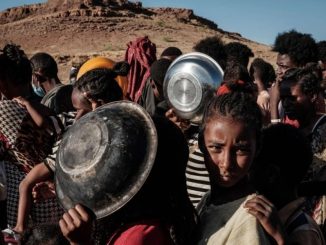
Ukraine acknowledged on Tuesday difficulties in fighting in its east as Russian forces regrouped after stepping up pressure and making advances on two cities ahead of an EU summit this week expected to welcome Kyiv’s bid to join the bloc.
The governor of the Luhansk region, scene of the heaviest Russian onslaughts in recent weeks, said Russian forces had launched a massive attack and gained some territory on Monday though it was relatively quiet overnight.
“It’s a calm before the storm,” the governor, Serhiy Gaidai, said.
Ukrainian President Volodymyr Zelenskiy had predicted Russia would step up attacks ahead of the EU summit on Thursday and Friday. He was defiant in a late Monday address to the nation, though referring to “difficult” fighting in Luhansk for Sievierodonetsk and its sister city, Lysychansk.
“We are defending Lysychansk, Sievierodonetsk, this whole area, the most difficult one. We have the most difficult fighting there,” he said. “But we have our strong guys and girls there.”
Gaidai said Russian forces controlled most of Sievierodonetsk, apart from the Azot chemical plant, where more than 500 civilians, including 38 children, have been sheltering for weeks. The road connecting Sievierodonetsk and Lysychansk to the city of Bakhmut was under constant shell fire, he said.
ALSO READ: Ethiopia set to negotiate as 9 million displaced, Tigray plunges into famine
Rodion Miroshnik, ambassador to Russia of the self-styled Luhansk People’s Republic, said its forces were “moving from the south towards Lysychansk” with firefights erupting in a number of towns.
“The hours to come should bring considerable changes to the balance of forces in the area,” he said on Telegram.
ATTRITIONAL PHASE
Russia sent tens of thousands of troops into Ukraine on Feb. 24 in what it called a “special operation” to degrade its military capabilities and root out what it calls dangerous nationalists.
It has also introduced a law making the spread of “knowingly fake” information or reporting that could discredit the Russian military an offence.
Dmitry Muratov, the co-winner of the 2021 Nobel Peace Prize and editor of an independent Russian newspaper, auctioned off his Nobel medal for a record $103.5 million to aid children displaced by the war. His paper, fiercely critical of President Vladimir Putin, suspended operations in Russia in March after warnings over its coverage of the war. read more
The war has entered a brutal attritional phase in recent weeks, with Russian forces concentrating on Ukrainian-controlled parts of the Donbas, which Russia claims on behalf of separatists.
In Odesa, Ukraine’s biggest Black Sea port, which is blockaded by the Russian navy, a Russian missile destroyed a food warehouse on Monday, Ukraine’s military said.
The United States and its European allies have provided weapons and financial assistance to Ukraine but avoided direct involvement in the conflict.
British military intelligence said Ukraine forces claimed their first successful use of Western-donated Harpoon anti-ship missiles, destroying a tug delivering weapons and personnel to a Russian held island in the Black Sea. read more
“Ukrainian coastal defence capability has largely neutralised Russia’s ability to establish sea control and project maritime force in the north-western Black Sea,” it said.
CAPTURED AMERICANS
Some foreign citizens have volunteered to fight for Ukraine.
On Monday, the Kremlin said two Americans detained in Ukraine were mercenaries not covered by the Geneva convention who should face responsibility for their actions. read more
Kremlin spokesman Dmitry Peskov’s comments were the first formal acknowledgment that the two, identified in U.S. reports as Andy Huynh, 27, and Alexander Drueke, 39, were being held.
A U.S. State Department spokesperson said they had been in touch with Russian authorities regarding any U.S. citizens who may have been captured and called on Russia and its proxies “to live up to their international obligations” in their treatment of any captive.




